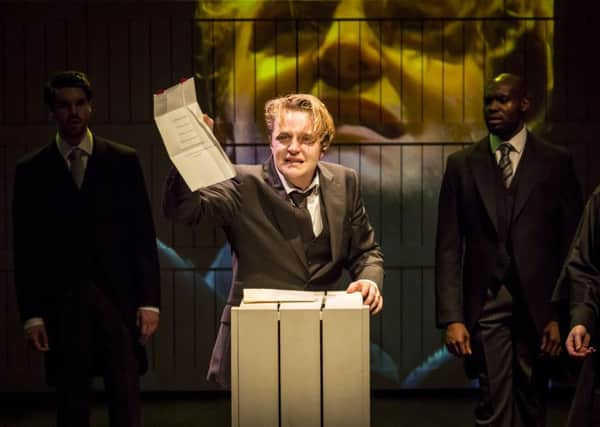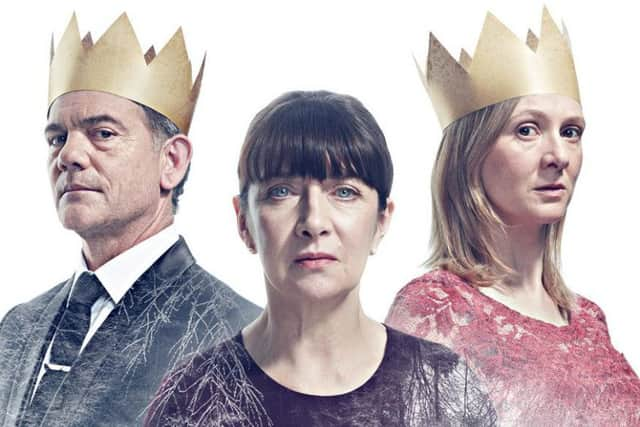Joyce McMillan on two very different Winter's Tales


And now, audiences in Scotland have a rare chance to see this mysterious and beautiful play in two major productions within a few weeks, as Declan Donnellan of Cheek By Jowl – one of the great Shakespeare directors of the last three decades – brings his international version to the Citizens’ in Glasgow, and the Lyceum stages its own new version, directed by rising young English star Max Webster, and featuring major creative contributions from award-winning Scottish writer James Robertson, and a top-flight cast which includes John Michie, Frances Grey, Jimmy Chisholm, and Maureen Beattie.
“Is The Winter’s Tale produced more often than it used to be?” says Donnellan, pausing in London between the production’s visits to Chicago and Nice. “I’m not sure. What I do know, though, is that it’s tremendously important, at the moment, to perform a play that affirms the existence of the unmeasurable, of things that simply can’t be quantified and reduced to numbers.
Advertisement
Hide Ad“I’ve been directing Jacobean tragedy all my working life,” he adds, “and there are huge elements of that kind of violent, dark tragedy in The Winter’s Tale. Yet Shakespeare is not like the other Jacobeans. With Shakespeare, there’s always some kind of hope, a sense of redemption. I don’t think he was a great believer in the afterlife, or anything like that. But I think he believed in love; he felt that people together, if they love one another, can make something happen.”


And Webster, working on the play at the Lyceum, is in full agreement about the play’s shifting moods. “The Winter’s Tale does this really bold thing of putting three plays into one,” says Webster. “First there’s this desperate domestic drama, then there’s the sudden shift into pastoral, and finally the mystery. I think it’s a play that asks whether there is any way out of the cycles of revenge and violence in which we often become trapped; and it has this quality of surprising the audience by providing completely unexpected answers, or possible answers.”
Where the two productions are likely to differ, though, is in their sense of place, and of cultural belonging. Donnellan is a passionate internationalist, long accustomed to designing shows for international festival stages (his version of Measure For Measure, made in Russia, was one of the hits of last year’s Edinburgh Festival) and he’s sceptical of theatre as an arena for explicit debate about national identity. He talks passionately about how inspired he and his Cheek By Jowl co-founder Nick Ormerod were, back in the 1970s, by the brilliant international repertoire and style pursued by the Citizens’ triumvirate of Giles Havergal, Robert David MacDonald and Philip Prowse. “People criticised them for not being Scottish enough,” says Donnellan, “but to me they were the most Scottish company of all, taking Scotland to the world, and the world to Scotland.”
At the Lyceum, though, Webster and Lyceum artistic director David Greig are taking a different approach. James Robertson has been commissioned to create a Scots version of some of the rural scenes, using a Fife form of Scots to capture the idea of a countryside with seashore somewhere not too far from the capital. Yet both Robertson and Greig are acutely aware of the old patronising cliché of using Scots language for mere comic relief; and Robertson and Webster are determined that the production will explore different registers of Scots voice, rather than limiting it to a few comic characters.
“I think the key thing,” says Robertson, “is to understand that both parts of the play, the court and pastoral, offer a mix of deeply serious, dark drama on one hand, and magic and lightness on the other – it’s just that the balance varies. And in writing dialogue for Perdita and her adoptive family, I’m trying to bear that in mind – these characters have a key part to play in resolving the tragedy, and they need to have authority and strength, as well as a sense of humour.”


And about the vital role of Perdita’s adoptive family, everyone involved in both productions seems to agree. “In the end, it’s always the ordinary people who really work out what’s going on,” says Donnellan. And for Webster, that sense of the importance of the pastoral characters is deeply connected to the family drama that sets the whole play in motion. “I think there’s a kind of urban neurosis in those early court scenes,” he says, “a tension that explodes into this insane fear and paranoia about female sexuality and fertility.
Advertisement
Hide Ad“In the pastoral scenes, though, that neurosis just isn’t there. Sex is just present as a force in nature, not some terrible sin or threat. That’s the beginning of redemption, that shift into a different psychological world. And what I hope is that in the end, people will find the play intensely moving. It’s a story about someone being given a second chance, when that seemed absolutely impossible; and in these times, I can hardly imagine a more important tale to tell.” ■
*Declan Donnellan’s production of The Winter’s Tale is at the Citizens’ Theatre, Glasgow, 24-28 January; Max Webster’s production is at the Royal Lyceum, Edinburgh, from 10 February until 4 March.